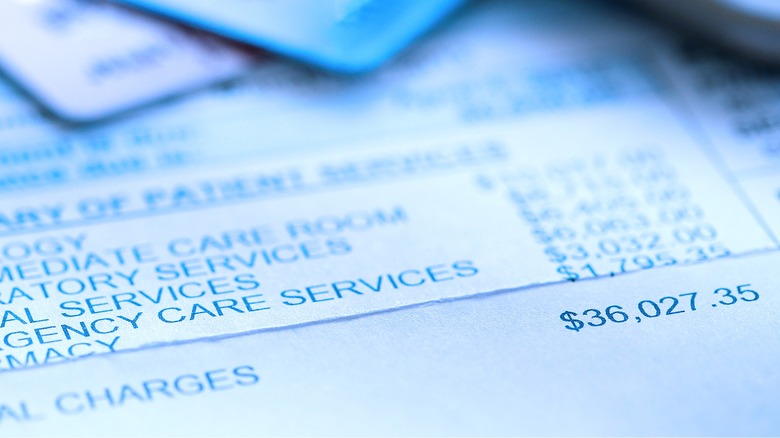What Really Happens If You Don't Pay Your Medical Bills
If you suddenly find yourself owing on a medical bill, what happens if you don't pay it? If you can't pay your medical bill at the time care was received, then it'll turn into medical debt, something that many Americans face. According to the Consumer Financial Protection Bureau, prior to a change in how medical debt was reported to the credit agencies starting in 2022, one in five Americans carried medical debt on their credit reports — totaling $88 billion. The U.S. Census Bureau's 2021 Survey of Income and Program Participation, meanwhile, found that 19% of United States households in 2017 had medical debt and owed a median amount of $2,000. But, for households without full insurance, their medical debt was 50% more.
Note that, according to Experian, you have time before your bill is sent to collections. Per the credit bureau, this length of time varies, but the soonest would be 60 days, though you may have up to four months to get things in order and pay what you can on your medical bill. To avoid having your debt sent to a third-party collection agency, it's important to work with your provider to try and come up with a payment solution you can handle.
Work with your provider
One reason why medical bills can so easily turn into medical debt is because a medical emergency isn't an an expense most anticipate, and if every dollar of one's monthly budget is already accounted for, it can be difficult to pay a medical bill once it arrives. Especially if this bill comes as a surprise; e.g., if you thought your health insurance would cover the entire bill, only to learn you're responsible for a greater portion of it, after all. Further, as said, for those without health coverage, a medical bill can prove a significant, immediate financial burden, one with lasting impact.
As for paying your bill, once you've requested an itemized medical bill and checked all the charges against the treatment and services you recieved, plus confirmed there are no out-of-network surprise charges — which consumers have been protected from since 2022 with the No Surprise Act (NSA) — and find that you do, indeed, owe on your medical bill, then you need to work with your provider to determine how the bill can be paid. Did you know you can negotiate medical bills? For instance, you could request an interest-free repayment plan or ask if there's a lower amount you could pay in full, to cancel out the remainder of the bill. Note, don't use a credit card to pay your bill, as this will not only add to your revolving debt amount, but you may not be able to negotiate.
Dealing with debt collections
While you may have 60 days (or perhaps more) before medical debt reaches collections, for many Americans, this is where their debt eventually does end up. In fact, medical debt is the largest type of debt in collections in the United States. Before a health care provider sends your debt to collections, however, you should be notified of this action. If possible, try and stop it from happening, as once your debt reaches a collection agency, it'll be different than trying to negotiate with your provider.
If your medical debt is sent on to collections, this could start a financial ripple effect that could not only, eventually, impact your credit, but, in a worst-case scenario, end you up in court, which could result in wage garnishments or a lien against your home. That's why it's critical to learn about your rights when it comes to debt collection, as well as your options when it comes to paying a medical bill.
Note that for medical debt — starting in 2022 – Experian, TransUnion, and Equifax have allowed a 365-day grace period for consumers to resolve their debt with collections. If you haven't been able to come to a resolution with a collection agency after this one-year period expires, then your medical debt will end up on your credit report. If the amount is below $500, though, it won't appear on your report. Further, any medical debt you do pay after it appears on your report will be removed. And, as of January 2023, medical debt in collections no longer factors into the calculation of VantageScore 4.0 credit scores.
Know your rights
According to a survey by the Consumer Financial Protection Bureau on consumer views on debt, 59% of the survey's respondents said that medical debt was the type of debt they were most contacted about by debt collectors about past-due bills and/or payments. Further, the CFPB said that one of the repercussions of medical debt is that people who owe may avoid seeking medical care when they need it.
There are also reports of confusion for people once a bill reaches collections, with them left unsure over whom to pay, and what charges are correct or not. For this latter point, this is why it's important to request an itemized medical bill before you pay anything, so that you can verify the charges with your provider and insurance company from the start, and then go from there.
When it comes to debt collectors, remember you have 365 days to resolve your debt before credit bureaus are notified, so know your rights if a debt collector tries a coercive credit reporting tactic to pressure you into quickly paying off your medical debt. Also, with regard to surprise bills resulting from out-of-network services, since 2022, per the No Surprise Act, you can't be charged this higher amount, which means a debt collector can't try and collect on this debt either. Further, per the FTC, debt collectors can't contact you repeatedly, nor call you before 8 a.m. or after 9 a.m. in your time zone. They also can't pose as someone else.



